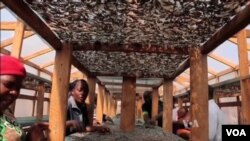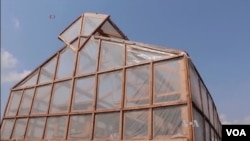In the African country of Malawi, fishing is a way of life for people who live near lakes.
The fishers have several methods to dry the fish for market. But since the fishers dry their catch in the open air, about half of it decays. It slowly breaks down and goes bad.
Now, solar tents are being used to help dry fish on Lake Chilwa, Malawi’s second-largest lake. The tents are helping communities to dry fish more effectively. When the fish dries quicker, less of it decays. It is ready for market sooner.
The solar tent is made from clear plastic. The plastic is stretched over a large wooden structure. The tent looks like a greenhouse, a glass building where plants can grow in cold weather.
Jennifer Mussa, a local fish trader, spoke to VOA.
“When we collect fish from the lake, we dry them inside this solar fish dryer and it does not take long to dry because it is so hot,” she said.
Dried fish is the main form of protein in Malawi. Fishing also employs over 50,000 people there, according to the Reuters news service.
Traditionally, the fishers have other ways to dry the fish. They include frying, smoking, or placing them on wire racks. But, by using those methods, the fish can decay during the drying process. Some animals try to eat the catch. The solar tent protects the fish.
Mangani Katandu is a fisheries expert from the University of Malawi. He told VOA that the solar tents decrease the time needed to dry the fish.
“Normally, they would take one-and-a-half to two days to dry. In here, they will put it in in the morning; by the evening, they would be taking the fish out.”
The solar tents have also helped the fish traders get higher prices at market for cleaner, better-quality fish.
Financing for the tents came from Cultivate Africa’s Future, a joint project between Canada and Australia. The project works to improve fishing and farming methods with simple innovations or machinery. The goal is to increase access to food, resources, and markets for the communities.
The project urges people to use energy-saving kiln ovens to smoke fish, not open fires. This helps the environment because people will need to cut down fewer trees for firewood.
Loveness Mphongo, another fish trader, said there are good reasons for using solar tents.
“We are using very little wood and it takes a short time to smoke lots of fish,” she said.
Fishing communities on Lake Malawi are also using solar tents. Lake Malawi is the third-largest lake in Africa.
I’m Alice Bryant.
Deborah Block reported this story for VOANews.com. Alice Bryant adapted her report for Learning English. George Grow was the editor.
We want to hear from you. Write to us in the Comments Section.
________________________________________________________________
Words in This Story
decay - v. to be slowly destroyed by natural processes; to be slowly broken down by the natural processes that destroy a dead plant or body
solar - adj. of or relating to the sun
tent - n. a portable shelter that is used outdoors and is held up with poles and ropes
preserve - v. to keep (something) in its original state or in good condition
rack - n. a frame or stand that has shelves, hooks, slots, etc., in which or on which you place things
innovation - n. a new idea, device, or method
access - n. a way of being able to use or get something
kiln - n. an oven or furnace that is used for hardening, burning, or drying something






